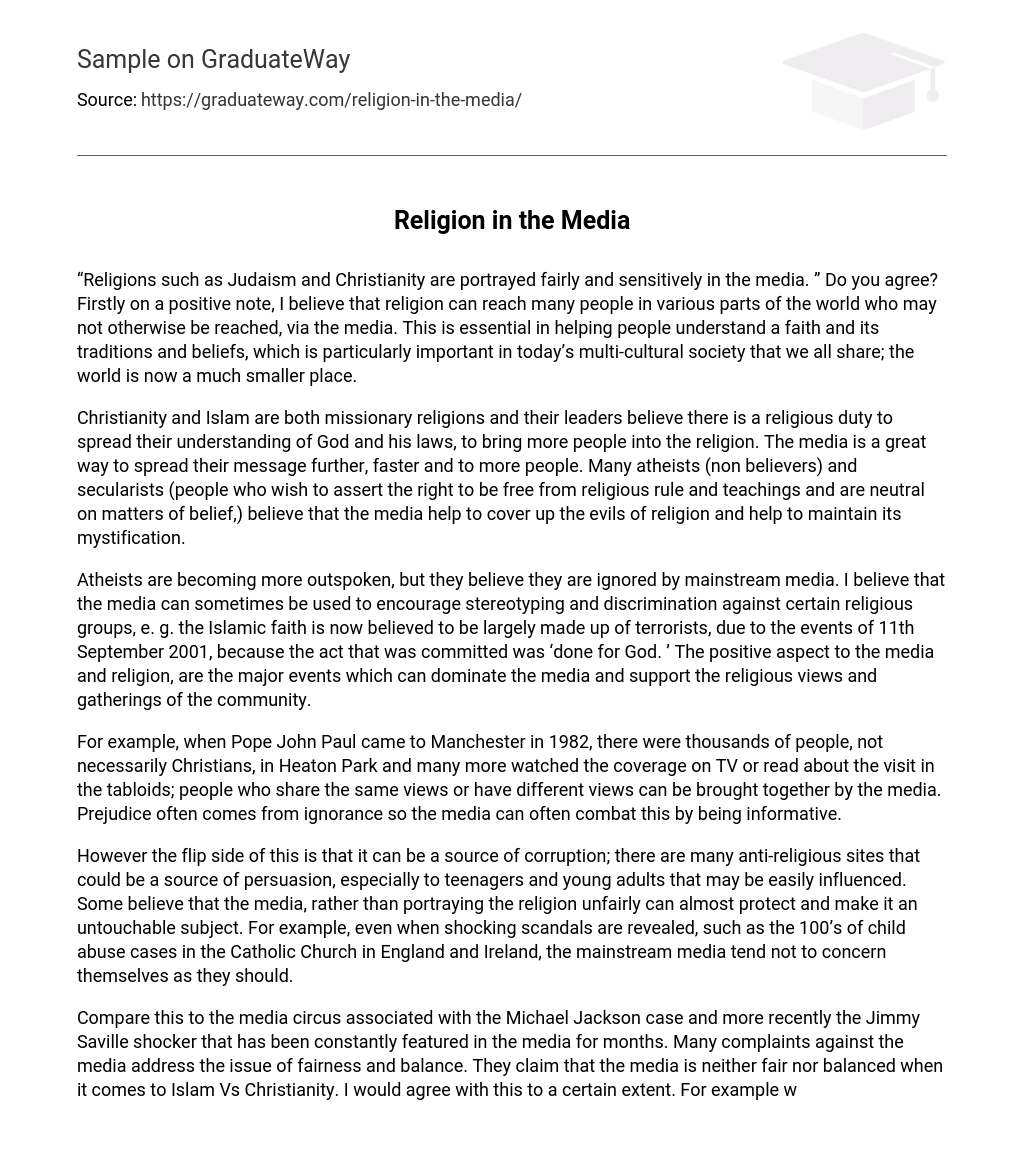“Religions such as Judaism and Christianity are portrayed fairly and sensitively in the media. ” Do you agree? Firstly on a positive note, I believe that religion can reach many people in various parts of the world who may not otherwise be reached, via the media. This is essential in helping people understand a faith and its traditions and beliefs, which is particularly important in today’s multi-cultural society that we all share; the world is now a much smaller place.
Christianity and Islam are both missionary religions and their leaders believe there is a religious duty to spread their understanding of God and his laws, to bring more people into the religion. The media is a great way to spread their message further, faster and to more people. Many atheists (non believers) and secularists (people who wish to assert the right to be free from religious rule and teachings and are neutral on matters of belief,) believe that the media help to cover up the evils of religion and help to maintain its mystification.
Atheists are becoming more outspoken, but they believe they are ignored by mainstream media. I believe that the media can sometimes be used to encourage stereotyping and discrimination against certain religious groups, e. g. the Islamic faith is now believed to be largely made up of terrorists, due to the events of 11th September 2001, because the act that was committed was ‘done for God. ’ The positive aspect to the media and religion, are the major events which can dominate the media and support the religious views and gatherings of the community.
For example, when Pope John Paul came to Manchester in 1982, there were thousands of people, not necessarily Christians, in Heaton Park and many more watched the coverage on TV or read about the visit in the tabloids; people who share the same views or have different views can be brought together by the media. Prejudice often comes from ignorance so the media can often combat this by being informative.
However the flip side of this is that it can be a source of corruption; there are many anti-religious sites that could be a source of persuasion, especially to teenagers and young adults that may be easily influenced. Some believe that the media, rather than portraying the religion unfairly can almost protect and make it an untouchable subject. For example, even when shocking scandals are revealed, such as the 100’s of child abuse cases in the Catholic Church in England and Ireland, the mainstream media tend not to concern themselves as they should.
Compare this to the media circus associated with the Michael Jackson case and more recently the Jimmy Saville shocker that has been constantly featured in the media for months. Many complaints against the media address the issue of fairness and balance. They claim that the media is neither fair nor balanced when it comes to Islam Vs Christianity. I would agree with this to a certain extent. For example when Salman Rushdie wrote ‘The Satanic Verses’ and hurt the religious sentiments of Muslims, the book was justifiably banned.
In 1989 the Ayatollah Khomeini accused Salman of blasphemy and announced a Fatwa which was covered on live TV and broadcast throughout the world. This resulted in Mr Rushdie and his family living in hiding in fear for their lives, for the following ten years. Was this justifiable? Especially when you compare it to Dan Brown and ‘The Da Vinci Code,’ his books were never banned. Didn’t ‘The Da Vinci Code’ hurt the religious sentiments of the Catholic Church, but this controversial book went on to be a worldwide best seller.
The media can often be a source of blasphemy, for example the film ‘The last temptation of Christ,’ was boycotted and picketed by Christian groups throughout the Uk, when it first appeared in British cinemas. The Catholic Church begged for ‘The Da Vinci Code’ to be banned, concerned that it mis-represents the church; not only as a murderous institution, but it also implies that the Christian faith itself is utterly false. Historically many people have been killed under the name of religion.
In modern times we are all familiar with the Northern Ireland troubles between the Catholics and the Protestants, the Kherds, the Serbs and the Croats and more recently the Jews and the Israelis. All these events were reported back to us through the media. Do the media glorify war? Does it have and unbalanced eye? Is it a form of propaganda? We are all familiar with the propaganda used by the Nazi’s in WW2, spreading hatred and lies about the Jews.
Many believe that propaganda is still at large in the media today and there is certainly evidence of this when you look at the events of September 11th. In conclusion I do believe that the media can be accused of all of the above offenses. However in today’s society it is a necessary evil; there are bad points about the media but there are also many good points. At the end of the day the media is a money making business and will always concentrate and feature on news that will create the most public interest, a larger viewing audience and sell the most papers.





